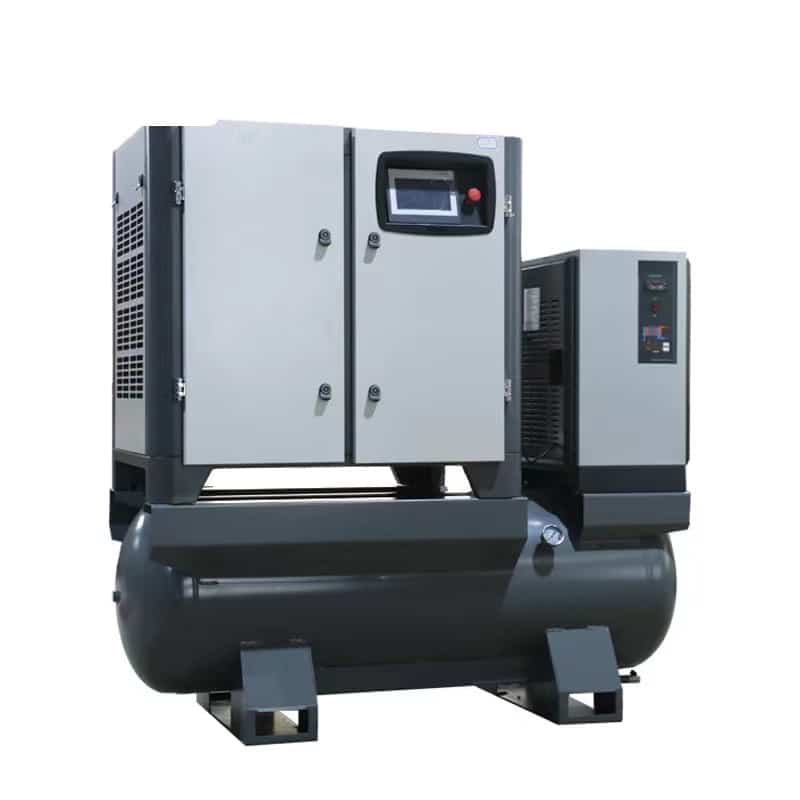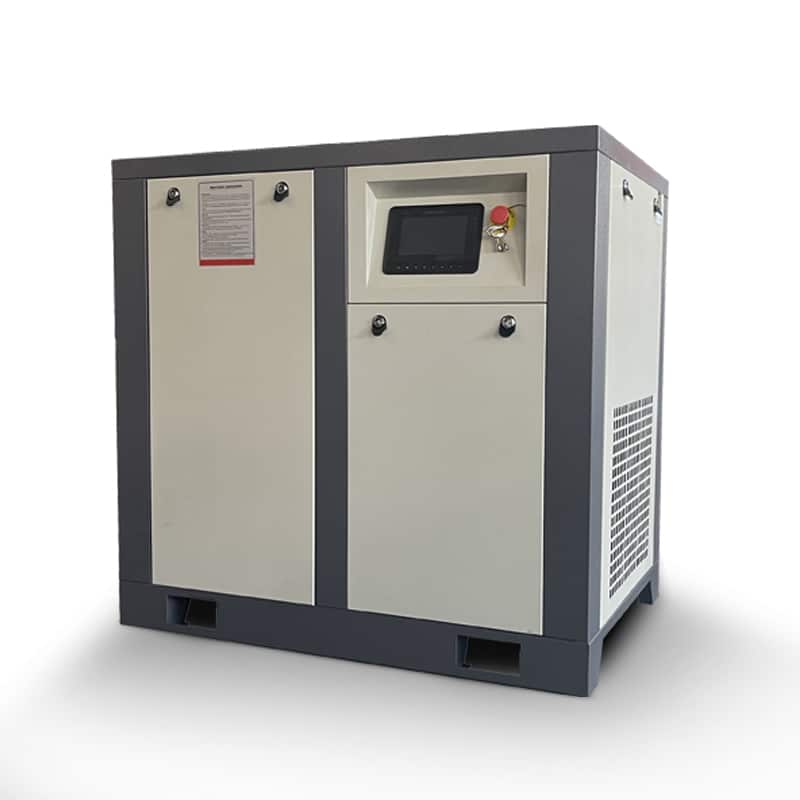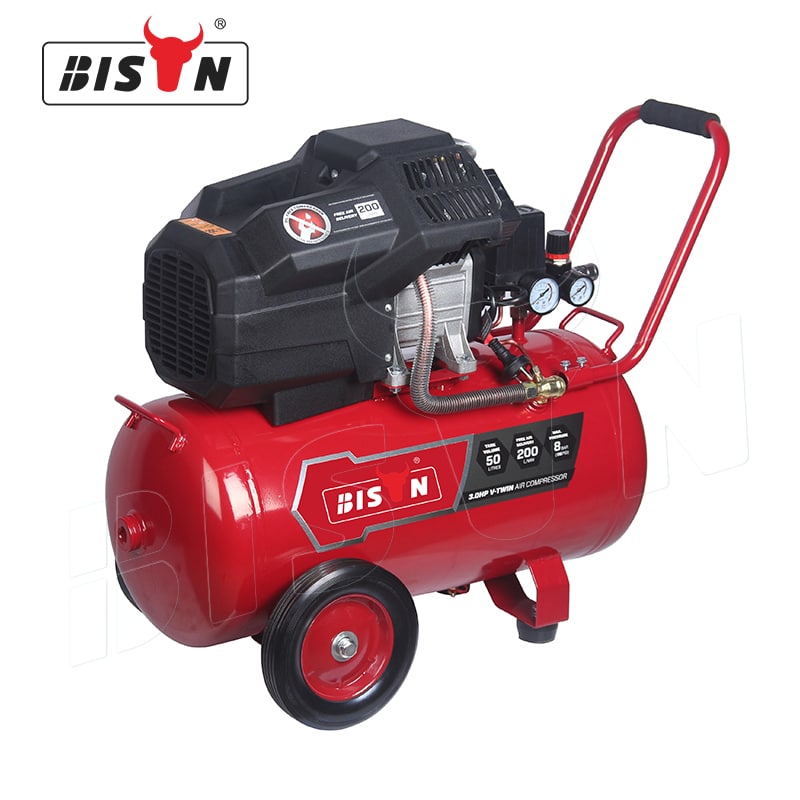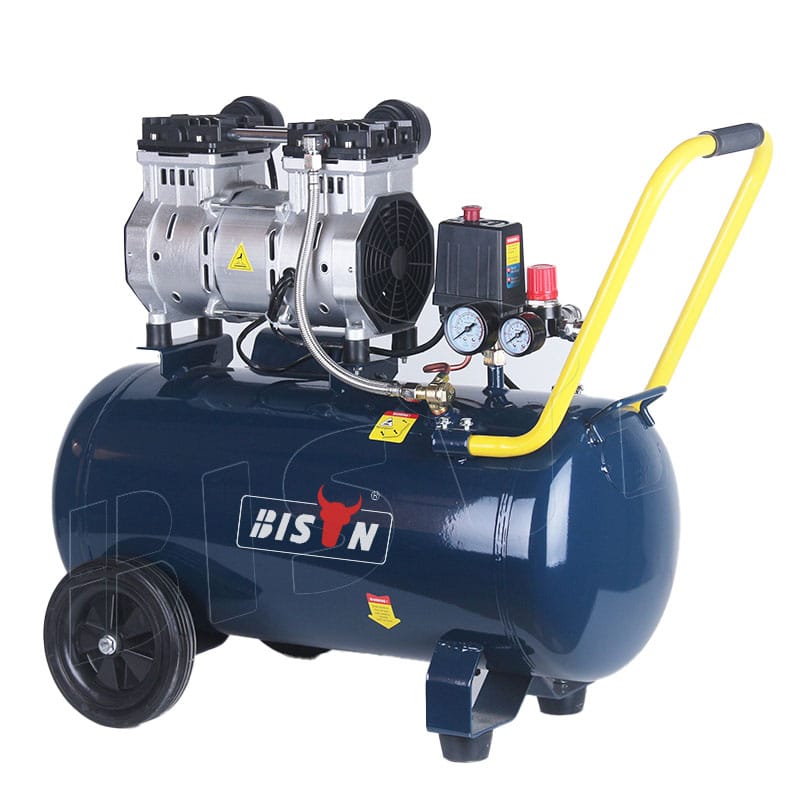air compressor blog
Portable vs stationary air compressors
- Dec 25, 2023
Industrial air compressors come in various types and specifications—but they can be divided into two basic categories: stationary and portable. Generally, stationary air compressor units have electric motors, while portable models run on diesel.
When you’re looking for an air compressor, each option offers a clear set of pros and cons—and the decision of which one to use will ultimately depend on the application. So, to better understand what type of air compressor is best for your facility, let’s take a closer look at the pros and cons of stationary vs. portable air compressors.
Portable Air compressors
These compact and mobile units are designed for on-the-go use. They come equipped with wheels or handles, allowing them to quickly move around different job sites or workshops. Portable air compressors are ideal for tasks that demand flexibility and mobility, such as inflating tires or operating pneumatic tools at various locations. They are also relatively lightweight and often more affordable. For this reason, they are a popular choice for entry-level users.
You can move or carry portable air compressors to any location where you need them. Most portable air compressors have tanks with two to thirty-gallon capacity. Multiple job sites benefit significantly from the use of portable air compressors. Some industries where portable air compressors are helpful include:
Construction
Use pneumatic tools with a portable air compressor on your construction site. A portable air compressor can power tools like jackhammers, wrenches, and riveting guns.
Manufacturing
Purchase a portable air compressor if your facility has a power outage. Since many portable air compressors run on diesel, you can use them to power critical areas.
Agriculture
Power pneumatic equipment with portable air compressors, such as dairy equipment or conveyors for moving feed.
Oil and gas
Power offshore or remote drilling sites using portable air compressors.
Pharmaceutical
Possess a portable air compressor to power equipment and fill mixing tanks with air.
Advantages of portable air compressors
On your job site, portable air compressors can offer a variety of advantages. Among these advantages are:
Portability
These air compressors are small and light enough that you can carry them anywhere throughout the job site.
Power
Portable air compressors have enough energy to operate various tool types, including nail guns, hammers, and sanders.
Safety
Small air compressors maintain the same safety procedures as their stationary counterparts.
Pounds per square inch (PSI)
These air compressors can have a wide range of psi. BISON has portable compressors up to 200 psi.
Cubic feet per minute (CFM)
When purchasing from The BISON, these air compressors can be 185 and 750 CFM.
Quiet
Portable air compressors are generally quieter than stationary ones, which is essential if you need them in a residential area.
Multifunctionality
These air compressors are multifunctional. You can use them for power tools and appliances. You can also use them to remove dust and dirt from your work area.
Disadvantages of a portable air compressor
While the diesel’s self-sufficiency makes it ideal for portable air compressors, there are several reasons why it is unsuitable for large-draw industrial applications. Again, given the fuel cost, a portable diesel air compressor can cost 2-4 times more than a stationary electric compressor to run over a long period. Therefore, in large-scale continuous-use contexts where portability is not a concern (e.g., manufacturing), whether to use a portable versus stationary air compressor is evident from a cost-effectiveness perspective.
Portable air compressors also require more attention and maintenance than their electric counterparts. For example, diesel engines must be refueled every 8-12 hours, and filters must be changed every 250 hours. In contrast, many stationary electric compressors can last up to 4,000 hours without maintenance.
Diesel engines in portable compressors are also noisy and produce heavy emissions – which are environmental pollutants and can also pose health/safety risks. That’s why, regarding industrial air compressors, stationary units are usually electric, while diesel is reserved for portable models.
Stationary compressors
In contrast, stationary air compressors are fixed in place, usually bolted to the floor or a solid surface in a workshop or industrial facility. These models offer more power and storage capacity. This makes them suitable for continuous and demanding applications such as sandblasting, industrial manufacturing, or operating large machinery. Stationary units often have ample storage tanks to ensure a constant compressed air supply.
The purpose of stationary air compressors is to remain standing. It will be connected to the electrical circuit of a building. Typically, stationary air compressors have tanks between 60 and 80 gallons. Stationary air compressors are ideal for:
- Auto repair shops.
- Industrial plants.
- Manufacturing locations.
Advantages of stationary air compressors
- Large tank: The tank’s capacity for air delivery and ability to store more air is enhanced by its size. The BISON stationary air compressors range in capacity from 60 to 240 gallons.
- Heavy-duty applications: Stationary air compressors are designed for larger or more complex and challenging applications, such as chemical plants or gas turbines. This air compressor can provide a more consistent airflow, allowing you to use it longer.
- CFM: The CFM ratings of stationary air compressors are 17.5 and 56.5.
- PSI: Stationary air compressors that you can get from the BISON come with a psi between 125 and 175.
Disadvantages of a stationary air compressor
Stationary compressors are ideal for fixed-location contexts (e.g., production lines)—but some industries demand mobility and versatility. For example, a construction company may need a portable air compressor that can be easily transported to different job sites.
Electric air compressors can be moved. However, the problem is the source of power. Remote job sites may need an adequate electrical supply to run heavy-duty electric compressors, which often require three-phase power (as opposed to the single-phase power found in residential/commercial buildings).
On that note, electric compressors are also subject to power interruptions, which can cause downtime.
Additionally, stationary air compressors require dedicated floor space to operate. Finding room to operate a stationary compressor safely can be difficult if your facility is tight on area. On the other hand, portable diesel compressors can be used virtually anywhere, anytime—which brings us to our next part.
Stationary vs. portable air compressors: What’s the best option for your application?
Generally, if you purchase an air compressor for an industrial application, a stationary compressor is likely the best option for your facility. They’re cleaner, quieter, and less expensive to run; plus, you don’t have to worry about refueling or the cost of that fuel.
If you need to purchase an air compressor for temporary use, or if it’s something you use occasionally in your shop or facility, a portable diesel compressor may be a better option. They are less expensive, do not require a power hookup, and can quickly load and unload for easy setup and takeaway operations.
Things to consider while purchasing portable air compressors
If you are purchasing a portable air compressor, there are some essential factors to consider to ensure that it is the right one for your needs.
Air pressure
The unit of measurement for the air pressure produced by an air compressor is pounds per square inch or PSI. The higher the PSI of the compressor, the more air you’ll need to power your air tools. To power most standard air tools, you will need around 150/200 PSI, but check the exact PSI required for your devices before purchasing. If it is only used to inflate tires, you can get away with a lower PSI (50-100 PSI).
Airflow
Cubic feet per minute, or CFM, is the unit used to measure the amount of air created and delivered to your tools per minute. Like PSI, a higher CFM means more air to power pneumatic tools. Different tools will require different CFMs. For example, a pneumatic drill typically needs 3-6 CFM, but an HVLP spray gun needs 12 CFM.
With PSI and CFM, it’s best to estimate the amount of air you need. A helpful tip is to multiply the requirements of your most significant tool by 1.5 and use that as the minimum requirement for your portable air compressor. This will ensure that you always have enough air for your needs.
Duty cycle
This is how long a machine can operate without stopping and cooling down. It also tells how long the device will need to cool down.
The duty cycle is measured in percent. For example, a machine with a 20 percent duty cycle can only run for 2 minutes and then needs 8 minutes off. However, a device with a 90% duty cycle can run for 9 minutes and then need 1 minute off. A 100% duty cycle means it can run non-stop. Some high-performance models will automatically shut off when a specific temperature is reached.
Remember that the machine’s duty cycle refers to operating at 100 PSI and 72 degrees. Therefore, high temperatures will affect the machine’s running time.
In general, a machine’s cost increases with its duty cycle. The duty cycle that will be best depends on your budget and how you will use the device.
Portability
When considering how portable an air compressor is, it’s helpful to consider factors such as weight, size, and whether it has a handle or wheels.
Portable air compressors will generally be smaller and lighter than standard air compressors. They are designed with small tank sizes and lightweight weight materials. However, the machine’s weight is worth noting; you should check that you can carry it comfortably.
Many portable air compressors have handles so you can easily carry them. Ensure the handles are strong, secure, and grippy to make the device easy to transport.
Some larger portable air compressors come with wheels for moving them. This means you can get a bigger and more powerful compressor but still be able to wheel it between jobs or locations. However, this means they are often too heavy to carry easily, so their mobility restricts your use.
Tank size
Portable air compressors usually come with tank sizes of up to 100 liters. How long you can run before having to fill up the tank depends on the size of the tank. Therefore, checking that the tank size suits your desired job is essential.
A small 24-liter tank is usually sufficient for home applications and small jobs. However, for larger jobs, a larger tank will work better. You must consider tanks more significant than 24 liters by size requiring extensive HSE certification by a qualified inspector each year.
conclusion
Choosing between portable and stationary air compressors depends on the intended application. Portable compressors offer unparalleled flexibility, allowing users to move them and work efficiently in different locations. They are ideal for mobile tasks such as tire repair or using pneumatic tools on remote construction sites. In contrast, stationary compressors support heavy-duty, continuous operation, such as operating industrial machinery or large-scale operations. The decision depends on portability requirements, required power, and frequency of use. Both types have distinct advantages, so it’s important to evaluate your specific needs before choosing the most appropriate option for any task. BISON as a professional air compressor manufacturer, whether you need a portable air compressor or a stationary air compressor, BISON can meet your needs, contact BISON to get your professional quotation
BISON Stationary Air compressors
BISON portable air compressors
frequently asked questions about Portable vs stationary air compressors
What is the difference between stationary and portable air compressors?
Portable compressors are ideal for the home and job site, while stationary compressors provide the high volumes of air needed to power automotive and production air tools.
Which type of compressor is the most efficient?
A rotary screw compressor operates most efficiently when it is operating at maximum load. Load means the compressor produces air, while unload means the compressor is idle. A compressor will be continuously loaded when its air production capacity matches the air demand.
What type of compressor is best?
A centrifugal air compressor is the most cost-effective for high-volume applications (above 6,000 CFM). A reciprocating compressor is the best choice for low-volume applications (less than 20 CFM). For everything in between, screw compressors are usually best.
What are the three basic types of compressors?
Rotary screws, vane, and reciprocating air compressors are the three most common types of air-positive displacement compressors found in small and medium-sized industries.
Which compressor is best for high pressure?
For air at very high pressures, we need reciprocating compressors. The only disadvantage of a reciprocating compressor is the reduced air supply.
What is the most common type of air compressor?
Piston compressors are the most common type of air compressor. They use pistons to draw in and compress air. Piston compressors are available in various sizes, from small portable to large industrial units.
If you have any enquiries about the BISON air compressor, we would love to hear from you.

















